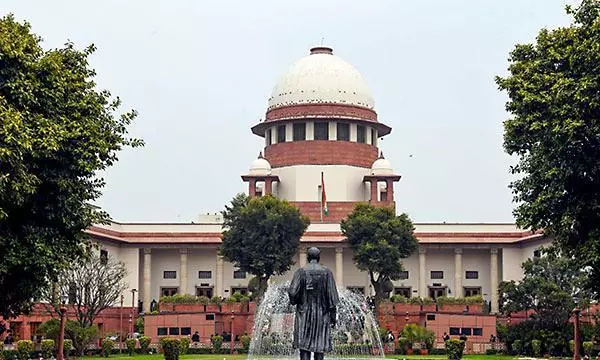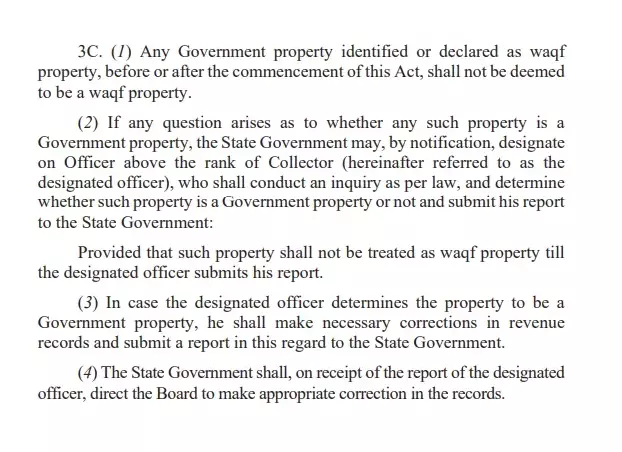
Waqf Act case hearing: Supreme Court reserves interim orders on 3 key issues
Centre defends Waqf Amendment Act, asserting that waqf by nature was a secular concept; petitioners challenging the Act call it a means to capture waqf properties

The Supreme Court on Thursday (May 22) reserved its interim orders on three issues, including the power to denotify properties declared as “waqf by courts, waqf-by-user or waqf by deed", after hearing a clutch of pleas challenging the validity of the Waqf (Amendment) Act, 2025.
On the third consecutive day of the hearing, the Supreme Court bench comprising Chief Justice BR Gavai and Justice Augustine George Masih heard senior advocates Kapil Sibal, Rajeev Dhavan, and Abhishek Manu Singhvi on behalf of those opposing the legislation and Solicitor General Tushar Mehta, representing the Centre.
Centre vs petitioners
The Centre strongly defended the Act, saying waqf by its very nature is a “secular concept” and can't be stayed given the “presumption of constitutionality” in its favour.
Sibal, leading the petitioners, described the law as a "complete departure from historical legal and constitutional principles" and a means to "capture waqf through a non-judicial process".
"This is a case about the systematic capture of waqf properties. The government cannot dictate what issues can be raised," Sibal said.
3 key issues
The petitioners at the present stage sought interim orders on three key issues.
One of the issues related to the power to denotify properties declared as waqf by courts, waqf-by-user, or waqf by deed.
The second issue was over the composition of state waqf boards and the Central Waqf Council, where they contend only Muslims should operate except ex-officio members whereas the last one is over the provision stipulating a waqf property won't be treated as a waqf when the collector conducts an inquiry to ascertain if the property is government land.
Contentious amendment
On April 25, the Union Ministry of Minority Affairs filed a preliminary 1,332-page affidavit defending the amended Waqf Act of 2025 and opposed any "blanket stay" by the court on a "law having presumption of constitutionality passed by Parliament".
The Centre notified the Waqf (Amendment) Act, 2025 last month after it got President Droupadi Murmu's assent on April 5.
The bill was cleared by Lok Sabha with the support of 288 members while 232 MPs were against it. The Rajya Sabha saw 128 members voting in its favour and 95 against it.
Also read
Follow this space for more live updates
Live Updates
- 22 May 2025 2:57 PM IST
Sibal: What is waqf by user? I will give you a note.
In 1954, first time they said Muttawaali (manager) is not the kind of person to register, and ultimately they decided there should be a survey to find out what waqf is. In the 1995 Act, there is a whole procedure, but nothing has been done. It’s the states (who should register), not the Muttawaali.
- 22 May 2025 2:54 PM IST
Sibal: It need not be registered (as waqf by user)
CJI: We must tell you what is on our minds
Sibal: Come to this proviso: Government property is 3C, but it also applies to disputes by individuals
CJI: If somebody is disputing, S. 83
Sibal: If there is a private dispute, it is no longer waqf by this expression 'wholly or in part, is in dispute'- there is no procedure for determination, no reference as to how this will be determined'
- 22 May 2025 2:47 PM IST
If I have a burial ground for 200 years, can govt say it's not integral to Islam?: Sibal
Sibal: Kindly see 3(1)(r) provision. If you take waqf by user gov property, 3(C) will apply
CJI: If the collector initiates the process for determination, then only it will apply. Someone will have to claim
Sibal: How will it be claimed? I have a burial ground for 200 years. Now we don't know, but it's an essential and integral part of Islam, but the government says, 'no, no it's not'...can it be taken?
- 22 May 2025 2:42 PM IST
CJI on why registration was made mandatory
CJI: In 1923, you are right, there was no provision technically, but it was given to the authority. Continuously from 1954, registration has been required. Read the 1976 report on why registration was required. For 100 years, the scheme was for registration, and if somebody did not register...we believe in open dialogue
- 22 May 2025 2:41 PM IST
Sibal: how does the title remain with me? After he gives the report, it’s already determined that this is government property, then only revenue entry will change because it’s sequential. A correction can’t be made until the determination. It’s not just revenue record change, the basis of his (SG) argument of S. 3(C) its irreversible. The right of community is taken away merely because there is a question.
- 22 May 2025 2:37 PM IST
There is no procedure established how determination (that property is government’s) will take place. Which law will be followed? What is the procedure?: Sibal
- 22 May 2025 2:35 PM IST
Referring to 3C (1), Sibal says SG has to first determine if the property in question is a government property or not.
- 22 May 2025 2:28 PM IST
All that 3C does is to change revenue entry, I continue to be in occupation and I will not be evicted, and they don't determine any substantive right- let's read 3C: Senior advocate Kapil Sibal


